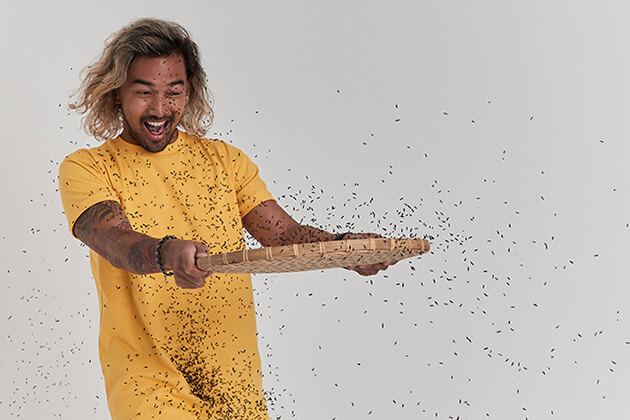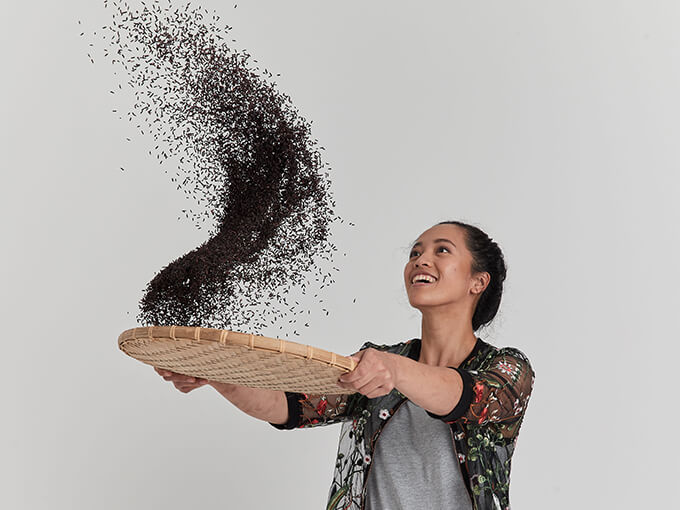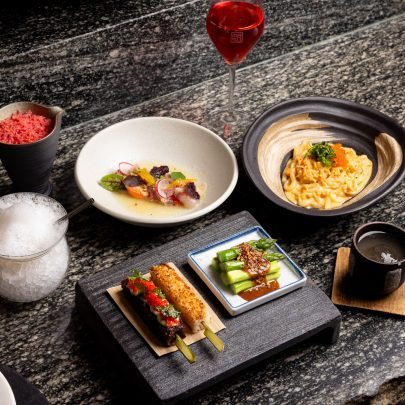May 20, 2019 Food
Satellites is a programme of public art experiences showcasing contemporary Asian artists in Auckland, with a variety of dance, food and visual arts experiences including voices from across the broad spectrum of “Asian”.
Rosabel Tan, who has been with Satellites since it began four years ago, says she only got her “oh, shit, art can be about me” moment in her 20s, the first time she started consuming media about a specifically Chinese immigrant experience. “It really just makes you feel so much less alone in the world.” Satellites speaks to this common phenomenon, a familiar anecdote for many people of Asian descent living in Western cities.
Roughly three out of 10 of Auckland’s population identifies as Asian, Tan says. And yet, when we look at the art landscape, it’s not as though three in 10 of the artists and the work we see is reflective of our diverse communities.
The next Satellites event, Nanam x The Cult Project, is already sold out a month out from the fact, a clear indicator Auckland is completely down for more events of this kind. Nanam’s Jess Granada and The Cult Project’s Carlo Buenaventura will partner with illustrator Marc Conaco for a Filipino pop-up breakfast series in which each collaborator chooses a dish they hold childhood memories of and writes a letter to that dish. Viv Teo – also part of the Satellites team – says, “they’re stories you don’t get through restaurants. Even if they live in the dishes, they get lost between the kitchen and the table.” The event will feature sikwate, pan de siosa and sinangag and tuyo at kape, Filipino food all commonly consumed at breakfast.
Metro sat down with the team from Satellites, Tan, Teo and Nahyeon Lee, and the trio behind the Nanam x The Cult Project pop-up, Granada, Buenaventura and Conaco to talk behind the scenes, cultural connection to food and Filipino representation in Auckland.
Metro: Why did you decide to join this event?
Conaco: Because we get to lead a conversation about our culture that comes from us as Filipino. My work has a lot to do with my identity as a Filipino, and the food is a big part of identity, but there is a lot of nuance to it. It goes with the art that I made for this show – it just shows a truer version of a Filipino versus the usual narrative of Filipinos you know in diaspora.
We are both the history that we are taught, which is our colonised history, and also our pre-colonised history. These are all parts of us, so sometimes we focus on one aspect, and that’s what you see with the Filipinos – “oh, wow, they look Spanish; they have Spanish names.” What I bring with my work is always, yes, it’s there, but there’s another aspect of us which is always ignored.
The illustrations that I did for this particular project centres on the anito. Each family back in pre-colonial time would have your own set of anito – they are a combination of your ancestors who have passed away, your nature spirits, and just your surroundings. So you could live near the mountain, you could live near the sea, and your anito changes in regards to the type of spirit that you believe in because we’re an island. What I’ve done with this art work… That was our animist religion, but of course we are now Catholic. It’s just an evolution of the anito.
Granada: I think it will be more of, not just a food event, but a discussion. Because Filipino food is not really talked a lot about, it’s something people always have a question mark about – “What is Filipino culture, what is Filipino food, and who are they really? Are they Spanish?”
Would you consider Filipino food as undervalued in Auckland?
Granada: I think people just don’t know anything about Filipino food, and that’s why we want to bring in ourselves to represent what we want to represent. I don’t want to say it’s undervalued, because we value it a lot. It’s a really important part of who we are, and we want to bring people outside of their comfort zone, because it’s always been just in a little box.
I think we can really bring something beautiful to the culture of Auckland. But it’s not supposed to be going into war. It’s supposed to be a really beautiful thing where you go into it with a lot of people. I think that’s what’s going to happen on the day.
Conaco: Colonisation does a lot of things to you where they tell you that you are not enough as yourself. We are quite insular with our food – there is not an aspect of sharing because we feel it may not be enough, because that’s what people have been telling us, that our food is not enough. What I’d like to add is that now we are taking it back. We are saying our food is enough.
For the Filipinos who grew up in the Phillipines and are now living in New Zealand who come to this, they’ll be like, “Oh, it’s a piece of home. New Zealand isn’t that strange or scary because there are people like me who are thriving.” For the Filipinos born here who have zero connection to it, it could spark a conversation in them, “Wow, this is my identity, and it’s something I could explore more because I can see people who are living it.” The last aspect is for people who have zero idea of Filipino food is: “Wow, these people have stories who are so like me.” We suddenly aren’t the Other or seen through pre-conceived notions from the media or whatever. You see us and we’re human.
Buenaventura: This event is a perfect platform for us to talk about these things and share who we are. Jess is from Luzon, Marc is from Visayas, I’m from Mindanao. Those are three big islands in the Phillipines, and each island is composed of hundreds of tribes. Most Kiwis will think, “Yeah, you’re Asian.” I say, “Yeah, but I’m Filipino first.” Asia is the biggest continent in the world, and it’s so diverse. We have different opinions of our country, too, and who we are as Filipinos. It reflects in the food, and that’s why there are differences there. When we first did the initial meeting, we tried to really talk about how we want to represent each dish so they don’t come across too similar, otherwise it’s just like a set menu. We’re not doing a set menu. Each food component represents a part of our history.

Do you feel as if you’re able to connect to Aucklanders in this way through Nanam and The Cult Project?
Granada: Absolutely. It was all about, for me, finding myself in a situation where people ask you, “So what’s Filipino food?” and you’re a chef and you’re like, “It’s this and that,” and they still have that question mark. “Oh, OK, so is it like Thai food?” That started the search to finding a much clearer answer. Yes, Nanam is a restaurant, but there’s more to just coming in than having a perfect meal or having a perfect dish. It’s not about just that; it’s also about experiencing something they’ve never experienced before, you know, something they don’t have an idea before about the person, the culture and the food itself. I think that’s what’s really important.
Buenaventura: Do I feel like I can represent Fliipino culture through the Cult Project? I guess so. It’s always inspired by something Filipino interpreted here in New Zealand. That was something I had in mind because of a conversation I had with another Filipina in Boston who had a popup. We were talking about sinigang, and she works closely with a lot of local farmers in Boston. Over there the closest thing you can get to Filipino flavours is at the Asian supermarket with the instant stuff. She wanted to be more local, true to who she is. She couldn’t find tamarind, but there was rhubarb. The rhubarb is very tart, with just enough fruitiness, so she used that instead. That actually stuck into my head –that there are many ways to interpret yourself. And that’s the beauty of it. I feel I’ve allowed myself to adapt in NZ: I’m not the Carlo that I was when I was in the Phillipines, or who I was when I first came here. There has been change, but that change is because I’ve learned to adapt. That reflects in my approach of cooking.
A lot of times people question the authenticity, but how do you gauge authenticity when it’s not even in the actual place? For example, tomatoes here in New Zealand are sweet; tomatoes in the Philippines are tart. If I’m making something that uses Filipino tomatoes, I wouldn’t be able to translate that authentically in New Zealand, but I’m able to take something that originated in the Philippines and reinterpret that within New Zealand. I always doubt people that question authenticity – the idea is not about being authentic, but about being genuine.
Do you ever feel like you have to change to fit other people’s perception of Filipino food?
Granada: It’s not about changing for what other people expect. I’ve changed the food because that’s what I’ve had to learn along the way – you put your experience into it and who you are as a chef. But you don’t change it because that’s what the people want to see. That’s not what people want to see. As a chef, I think the most extraordinary thing I’ve seen is, when you put down a dish and people don’t get mesmerised with it, you have to embrace the fact that not everyone will accept it. But if it’s you and you’re happy with it, people will be more confident that this person knows what she’s doing. That’s when they start trusting you, and that’s when you trust yourself.
For me, Nanam is a continuous project of introducing myself and my culture, especially with the amount of attention it gets and the amount of exposure that we get. I always see the young chefs coming out cooking Filipino food, and it makes me excited because it means, OK, we’re starting something. Because when I started four years ago, not many people even asked the question, what is Filipino food? That’s the first step – people asking, What is Filipino food? And someone going, I’ll bring you to Nanam.
This interview has been edited and condensed for clarity.
Nanam x The Cult Project is now sold out. For more Satellites events, visit their website here.
Follow Metro on Twitter, Facebook, Instagram and sign up to our weekly email





